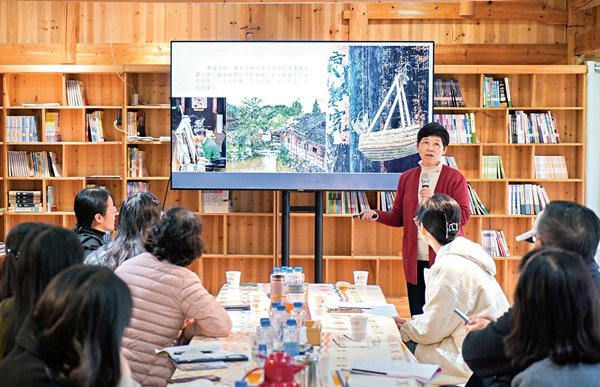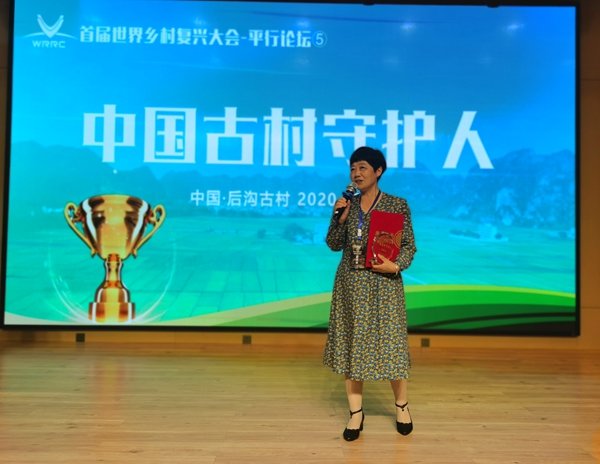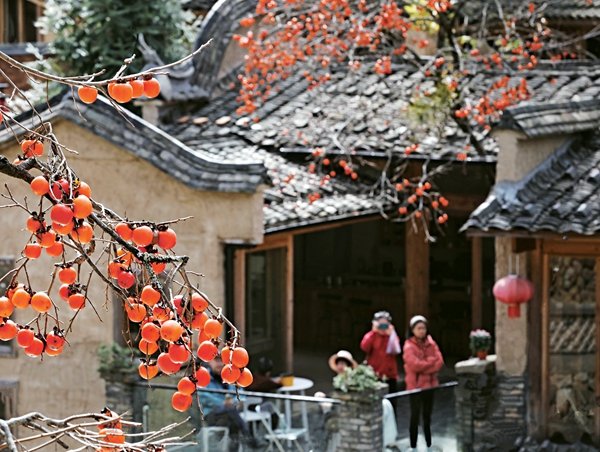Protecting, Rejuvenating Ancient Villages

In the hearts of the villagers in Pingnan County, in southeast China's Fujian Province, Zhou Fenfang's name brings a feeling of warmth. Thanks to Zhou and her team's efforts, Pingnan has embarked on a new path of revitalization, through cultural and creative industries, and Zhou and her team have achieved remarkable results in protecting and developing the region's traditional villages.
In Pingnan, ancient villages, formerly on the verge of decline, have been rejuvenated through thriving cultural and creative industries, and thanks to the rural tourism industry. As such, the villages have undergone a magnificent transformation, and they have become the poetic and idyllic places Chinese have longed for.
Zhou, former Chairperson of the Pingnan Committee of the Chinese People's Political Consultative Conference, is Vice-President of the Pingnan Rural Revitalization Research Institute. During the first World Rural Revitalization Conference, held in Taiyuan, capital of Shanxi Province, in September 2020, Zhou was honored as one of the guardians of ancient villages, for her efforts to protect and rejuvenate traditional villages.

Since 2015, Zhou and her team have invited domestic and international artists to establish studios and carry out art projects in Pingnan. They have also invited art-related enterprises to open outlets in the villages.
In 2020, the Pingnan Rural Revitalization Research Institute was established in Siping Village. Professor Wen Tiejun, a renowned expert in agriculture, rural areas and farmers, is president of the institute.
From being a key county for poverty alleviation to receiving the title of "demonstration county for traditional villages' cultural and creative industries," the county has established the "Pingnan model" for rural revitalization, presenting a trend of "people coming, village rejuvenating, industries thriving, and culture prospering," and activating rural resources and rural vitality.
Developing cultural and creative industries, and a rural tourism industry, not only cultivated the cultural atmosphere of the region's ancient villages, but also helped villagers increase their incomes and strengthen their sense of gain, happiness and security.
"Pingnan has created a model of 'Party (Communist Party of China) committee and government, plus artists, ancient villages, villagers and the Internet,' and it has constantly promoted in-depth development of cultural and creative industries," Zhou says.
With support from the local Party committee and government, Pingnan County, located in the middle region of the Jiufeng Mountains, has overcome the inconvenience created by geographical location, and it has realized "zero-distance communication" with the outside world, with the help of the Internet.

Paintings created by villagers have been displayed on social media platforms. People across China are increasingly willing to pay for the villagers' paintings. The beautiful natural scenery of Pingnan has been attracting tourists from across the country.
In the bars, cafés, bookstores and homestays, which have been transformed from ancient dwellings, people — locals and tourists alike — find themselves immersed in the artistic atmosphere of the traditional villages. The ancient charm of the rural areas provides the soil for artistic creation, and, in turn, the art creations nurture the development of rural areas.
Zhou says there are three objectives to protecting and developing the ancient villages in Pingnan. The first objective is to protect the villages' appearance, water systems and overall environment; second, to preserve and inherit rural cultural heritage and create cultural brands; third, to implement the "three attractions" and "three innovations" mechanism.
"The 'three attractions' refer to attracting high-level talents, new villagers, and bringing back natives who work away from the villages. The 'three innovations' refer to innovating the rental mode of ancient residential buildings; innovating the renovation mode of ancient villages, and transforming ancient dwellings into art spaces, shared spaces and cultural spaces; and, innovating the rural governance mode, including issuing residence permits to settled new villagers, thus injecting fresh blood into rural revitalization," Zhou explains.
Each village has its own approach and cooperation methods to develop cultural and creative industries, Zhou adds. While summarizing the experience of Pingnan, Zhou says she believes Pingnan has grasped the opportunity, presented by the rapid development of the Internet, to redefine the values of ancient villages.
"Clumsy birds have to begin flying early. But the birds must also 'dare to fly.' In the industrial civilization era, Pingnan was a clumsy bird. But in the ecological civilization era, we have dared to try, and we have grown into a beautiful bird, proving that a small county can make great achievements," Zhou says.
Photos from VCG and Interviewee
(Women of China English Monthly August 2024)
Editor: Wang Shasha
Please understand that womenofchina.cn,a non-profit, information-communication website, cannot reach every writer before using articles and images. For copyright issues, please contact us by emailing: website@womenofchina.cn. The articles published and opinions expressed on this website represent the opinions of writers and are not necessarily shared by womenofchina.cn.

 京公网安备 11010102004314号
京公网安备 11010102004314号